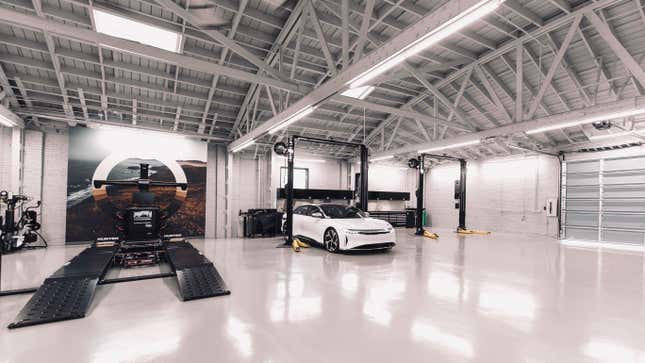
It’s no secret that automakers are struggling right now. Supply-chain issues caused by large container ships blocking canals and that Canadian Convoy months back didn’t help an already suffering global supply thanks to factory shutdowns during the height of the COVID-19 pandemic. Now, a war waging overseas has also limited supplies and auto production. The domino effect is never-ending and on-going as of late and appears to be rearing its ugly head in the production of newer vehicles, especially for startups, like what’s happening with the Lucid Air.
Oddly, Lucid’s startup problems are a tiny bit expected, as the company still remains a startup and is fairly shiny and new in the hype of new automakers. It’s not expected to be an outright success from launch, especially in the midst of a supply crisis.
However, new information revealed by sources in an Insider article published this week reveals just how much extra work the company has had to do, and the substitutions it has had to make, to get its cars on the road sooner than later. Some, as a car person, are questionable to say the least.
Insider says it spoke to 13 people, currently and formerly employed by the automaker, for the interview. One interviewee, a former supervisor, described it as, “We were running by the seat of our pants.” Because of the complexity of Lucid’s design, elements like the glass for the windshield and roof would arrive broken, and some parts just wouldn’t fit when they arrived, either. In some cases, a car designed with one part in mind would need a substitute to finish it or get it into production, and that substitute might not even work with all the systems already produced and installed on the vehicle.
Many cars were coming off the line only 80 percent finished. Parts were getting ordered from Amazon. Meanwhile, desk-set employees were being shipped from headquarters in California to Arizona to help make the vehicles themselves — many of Lucid’s employees putting in 100-hour weeks to keep up. It has been a production hell of its own.
Automakers are all facing tough decisions, substitutions and quality issues in this age of global supply insanity, but the Lucid sources mentioned multiple issues with cars coming off the line, and this could seemingly have much to do with their recent set of recalls. Or simple-fix issues like software upgrades:
Lucid owners have reported issues with the Air’s software upon delivery, including not having access to adaptive cruise control, a feature common in far cheaper cars. “I had no idea certain features weren’t going to be available,” one owner in San Diego said. The company has since released a number of software updates addressing those complaints, though car-buying site Edmunds noted this week these have to be remedied before it could recommend the vehicle for consumers.
Developers told Insider they went to early customers’ homes to make software upgrades that should have been available over the air.
Today’s customers are somewhat understanding in this state of the car market and are more willing to accept delays and compromises for a finished vehicle. But for a vehicle priced at $170,000, the Air, it should feel like a six-figure car. It should look like a six-figure car. And parts off of Amazon, while minute in importance, still doesn’t quite feel “luxurious” and six-figure-sounding to me.
You can read more on what Lucid insiders had to say to Insider, and the quality issues the automaker is trying to tackle here.